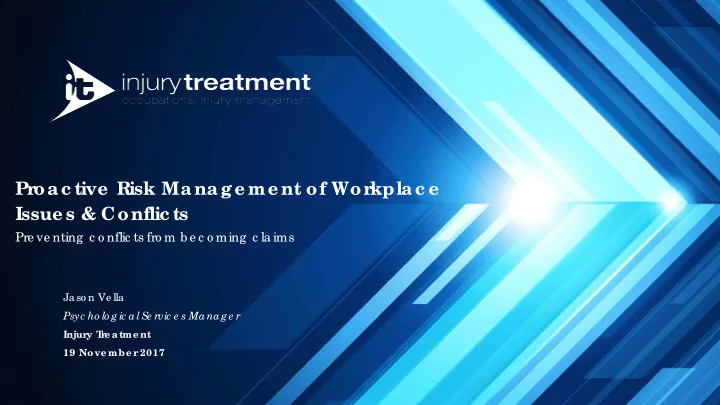

Proa c tive Risk Ma na g e me nt of Workpla c e Issue s & Conflic ts Pre ve nting c o nflic ts fro m b e c o ming c la ims Ja so n Ve lla Psyc ho lo g ic al Se rvic e s Manag e r Injur y T r e a tme nt 19 Nove mbe r 2017
Claims that came from Conflict What is the percentage of claims you have seen in your time with your current organisation, which have their origin in conflict? 0-25% a) 26-50% b) 51-75% c) 75-100% d)
Psychologists and the Workplace
Organisational Learning
What does it mean to be pro-active?
Micro-inequities S mall, interpersonal events that are hard to prove May be unintentional and even unrecognized by the perpetrator Often inflicted upon people who are on the outside of group dynamics, or different in some way Checking emails or phone during a conversation Consistently mispronouncing or not knowing a person’s name Taking the same person out for lunch or meetings Interrupting a person Only making eye contact with men or shaking hands differently Allowing the same people to speak in meetings Typing whilst on the phone Rolling your eyes An inconsistent approach to expressions of gratitude Emailing outside work hours Facing away from someone while talking to them
Micro-affirmations Micro-affirmations are often subtle, apparently small or unimportant affirmations that make people feel acknowledged and valued Active listening Giving credit appropriately Keeping feedback fair, specific, timely, consistent & clear Being supportive when something doesn’ t work out Encouraging equitable contributions in meetings Remembering important personal details Express praise & gratitude Greeting your team with names equitably Introducing people at work meetings/ functions
Conflict Policy Early Role Clarity Intervention Points of Intervention Performance EAP Culture Mediation Task Analysis
Policy S ettings: Conflict Management Do we have a well articulated and executed conflict management policy? How is conflict viewed within the organisation? What training and resources are available regarding conflict management? What communication processes are included in conflict management? Whose role is conflict management and is it reviewed via KPIs? How accessible are informal and formal mechanisms for getting assistance? How senior are those forms of assistance? What time frames are included in any process?
Policy S ettings: Conflict Management How many of these factors are in place in your organisation? A shared understanding of how we view and take advantage of conflict Policy which reflects this position Consistent application of the policy at all levels Clear expectation (KPIs) as to whose j ob it is to respond Training for those individuals on their conflict management style Rapid access to support to manage conflict Non-j udgemental approach to parties involved
Mediating Factors (that reduce conflict) Working with others directly, day to day and developing confidence about their skills and knowledge in comparison Task with your own Having secure knowledge of Interdependence the extent to which the individual is empowered to address concerns before Having confidence and when they become that procedures conflicts (or claims) around conflict Procedural management are well Agency Justice defined and uniformly followed
Policy S ettings: Role Clarity How accurate and meaningful are the current j ob descriptions? Where are the risks of diminished role clarity likely to come from? What are the procedures for regular informal and formal performance development? How transparent is the reward and remuneration policy? How well connected to recruitment and selection are these definitions? What opportunities are there for issues to be raised?
Psychological Job Task Analyses Our organisation currently has access to: No documentation describing either physical or psychological a) demands in our roles Documentation describing only physical demands b) Documentation describing physical well and psychological briefly c) Thorough documentation regarding physical and psychological d) demands
Psychological Job Task Analyses Do we have current, comprehensive psychological task analyses for roles? How well aligned to psych task analyses are Recruitment On-boarding, Return to Work Learning & Professional Development resources? Do we have preferred providers for training, EAP , selection, medical services who understand the functional psychological demands of the roles?
Mediation Do we have a well articulated and executed policy on mediation? Is Mediation well understood? Do we have an effective network of mediators? Do we get comprehensive feedback from mediation sessions? How accessible is mediation? Could we have internal mediators trained up from the Ops teams?
What is your EAP doing for you? How well promoted and utilised is the EAP? Is it crisis intervention of last resort or used to enhance well-being? What is the utilisation of the Manager Assist service? What is the utilisation of Managed Referrals? Is the reporting regular and specific enough to lead to corrective action? Does the EAP connect well to internal resources? Could the EAP support other conflict management processes?
Early Intervention Do we have a well articulated and executed policy? What is the organisational culture regarding mental ill health? What is communicated to teams as someone exits and returns? Are boundaries regarding flexibility of role, well recorded and maintained? How quickly can you start to share psychological functional demands with treating psychologists Are you getting functional treatment goals from treating psychologists? Is there a rationale for periods away from work or is this j ust bed rest?
That’s a lot to consider, right? Jason Vella If you have any furt her quest ions or would Psychological Services Manager like a deeper dive int o t hese t opics and jason.vella@ wellnessarchitects.com.au how t hey might be operationalised int o 0455 086 141 solut ions for your t eams feel free t o get in t ouch
Recommend
More recommend